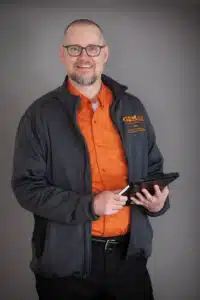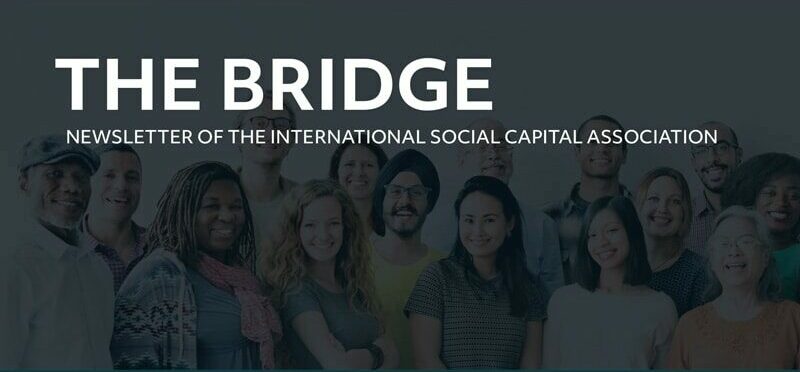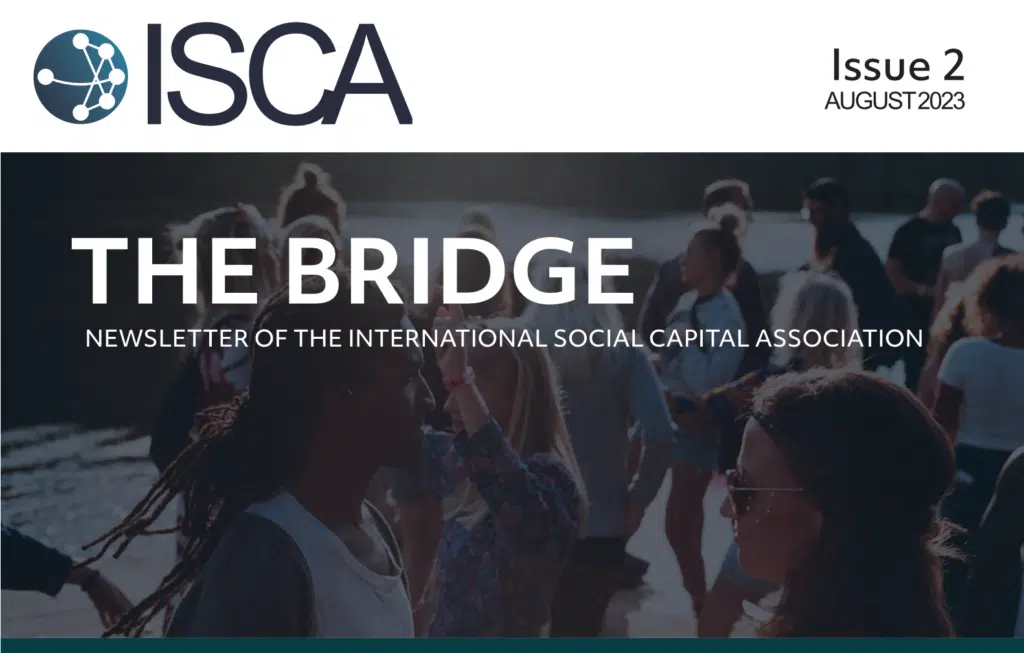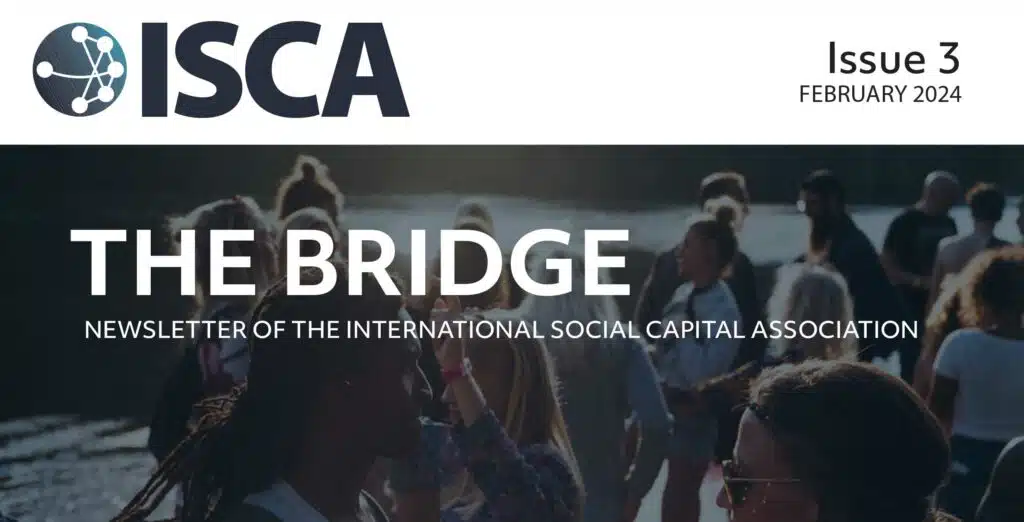Welcome
Dear ISCA Members
Welcome to the latest edition of The Bridge – Newsletter of the International Social Capital Association. As we embark on this journey of knowledge exchange and scholarly discourse, we are delighted to bring you a curated collection of insights, updates, and accomplishments that reflect the vibrant spirit of our community.
It is now summer in the northern hemisphere, which is a good opportunity to go out, meet friends and/or new people and build some social capital. Social capital is becoming more important as a research topic every day, as increasing polarisation and the growing ecological challenges underline the need to work together. Our common topic has become trendy again.
Download a PDF of this newsletter
News from the Board
Meanwhile, as the ISCA board, we’ve got a few things to tell you about.
· We all waited very long for a social capital conference to take place. And now it’s finally happening: The first Social Capital conference is going to be held from March 26-28, 2026, in Dubai. It’s all thanks to Heriot-Watt University, Dubai campus. Here’s the call for abstracts: https://www.socialcapital2026.com/abstract-submission/
· Just to let you know, the deadline is September 1st. Can you spread the word for us? You can access a poster and images to promote the conference here https://www.intsocialcapital.org/isca2026-promotional-materials/. Feel free to share it with your colleagues who might be interested. It’d be great to get some referrals to other organisations and newsletters too. If you have any questions, just give us a shout.
· We’ve started a new video series to go with our YouTube webinars. The “One Minute About Social Capital” series should help you get started on the topic in no time. Typical topics are things like “What’s your social capital story, and what do you like about your research?”. So far, we’ve uploaded videos from Professor Daniel Aldrich and Professor Matías Membiela-Pollán. Naturally, we’re keen to carry on with this series. So, if you can contribute, feel free to reach out.
Like last year, a bunch of ISCA members went to the Sunbelt Conference in Paris this year. We got to know each other over a few drinks and had a great time chatting about some social capital research projects. Hey, just wondering which conferences you’re heading to next? We’d love to organise more ISCA-member meetings at different conferences.
Member Highlight
Featured ISCA member – Perron Goodyear

My professional journey began in communications, public relations, and fundraising. While working in community relations for an NGO, I received a call to assist the local police service during a search and rescue operation. Since the usual team leader was unavailable, the call was forwarded to me. After successfully managing that response, I was appointed as the local team leader for disaster and emergency response.
Over the past 20 years, I have been deeply engaged in disaster and emergency management, gaining valuable experience across public and private sectors as well as non-governmental organizations (NGOs). From August 2016 to November 2022, I served as the national director of disaster and emergency management for an international NGO. In 2022, I founded Goodyear Emergency Management Consulting and currently serve as a sessional instructor in the School of Public Safety, Emergency Management Division at the Justice Institute of British Columbia.
With two decades of expertise in disaster and emergency management at the local, regional, and national levels, I am passionate about incident management, crisis intervention, and communications. I am recognized for defining and coordinating overlapping roles and responsibilities within the four components of the disaster and emergency management continuum: mitigation, preparedness, response, and recovery.
How do you employ the principles and ideas of social capital in your business operations?
I firmly believe that during disasters, social capital—the networks of relationships and mutual trust within communities—becomes a crucial lifeline. It enables faster response times, facilitates the sharing of resources, and strengthens resilience in the face of adversity. Neighbours help one another, local organizations mobilize support, and informal communication channels often prove more effective than official ones. When infrastructure fails or emergency services are overwhelmed, strong social connections can mean the difference between survival and suffering. Communities with high social capital recover more quickly, as they leverage trust and cooperation to rebuild, adapt, and support the most vulnerable. In essence, when disaster strikes, it’s often not just government aid but the strength of social bonds that truly holds people together.
Goodyear Emergency Management (GEM) Consulting recognizes the importance of community and social capital. Building community resilience starts before disaster strikes so recently GEM added Community Emergency Response Team (CERT) Basic Training to our services. Establishing a Community Emergency Response Team (CERT) can empower local volunteers with the skills and confidence to support emergency response efforts when it matters most. This two-day course blends theory with hands-on training, ensuring local teams are ready to take action.
In addition, GEM Consulting was one of the early adopters of the Emergency Management Logistics (EML) Canada platform. The EML platform helps create a network that fosters a dedicated community of practice by bringing together professionals in the emergency management sector. It creates a dynamic, interconnected network where individuals and organizations can collaborate, share knowledge, and enhance their collective expertise—before, during, and after critical events. EML helps build the social capital of emergency and disaster management practitioners.
Relationships are an important element to successful business and research operations, how has your academic background and experience in business changed or reinforced your belief in the power of human connections?
Early in my career, I occasionally faced questions about not spending enough time in the office. My response was always the same: if I were sitting at my desk for 40 hours a week, I wouldn’t be fulfilling my responsibilities effectively. Disaster and emergency management require presence in the field, direct engagement with stakeholders, and proactive relationship-building.
Pursuing my Master’s in Disaster and Emergency Management further solidified my understanding of the critical role that relationships play in this field. I’ve often said that an emergency is not the time to exchange business cards—it’s already too late. Strong professional connections and established trust must be built long before a crisis occurs.
Networking is not just beneficial in disaster and emergency management—it is essential. The ability to foster partnerships, collaborate with key agencies, and maintain open lines of communication ensures that when an emergency does happen, teams can act swiftly, seamlessly, and efficiently. A well-connected network is often the difference between a chaotic response and a coordinated, effective approach. Throughout my career, I have prioritized building these relationships, knowing that they are the foundation of strong emergency management.
As an entrepreneur who values and champions the role of social capital, what areas of research would you find most helpful? If you were to suggest ideas and focussed questions to academics in the field, what would be most valuable to you?
With all due respect to my academic colleagues, I have always maintained that, as a practitioner, research just for the sake of research is of no interest to me. I need to know the practical value as a disaster and emergency management professional. Research priorities should be guided by practitioner needs—ensuring studies align with real-world challenges rather than being purely theoretical.
I now consider myself a pracademic – someone who is both an academic and an active practitioner who bridges the gap between theoretical research and practical application.
I would like to see more research on how social networks can influence emergency preparedness. Research suggests that individuals with larger and more diverse social networks tend to be better equipped to handle emergencies because they have greater access to material, informational, and emotional support. Would people take the steps needed to be more prepared if encouraged to do so by someone within their own social network? Since social influence is a powerful motivator, could peer encouragement significantly impact individual preparedness behaviors? Further research could examine how trust, familiarity, and shared experiences within social networks shape emergency readiness.
Government policy sets the rules and processes for societal structures, if there was one area where you think social capital is undervalued, what would that be and what recommendations would you offer to improve the employment and understanding of social capital?
Social capital is often an underappreciated asset in emergency response efforts. Too frequently, spontaneous volunteers—individuals eager to assist during a crisis—are turned away due to liability concerns or logistical challenges. While these concerns are valid, overlooking local volunteers can mean missing out on a critical resource that strengthens community resilience.
Emergency management professionals and policymakers must find effective ways to integrate spontaneous volunteers into disaster response frameworks. These individuals not only expand response capacity but are often deeply embedded in their communities, possessing local knowledge and trusted relationships that can enhance recovery efforts. By developing clear guidelines, training opportunities, and risk mitigation strategies, we can harness the power of local networks to create more adaptive and inclusive emergency response systems.
Finally, there is often is disconnect between the academic researchers and the field of practice like yourself. How would you recommend these two important arenas better understand each other’s roles and responsibilities?
Bridging the gap between academic research and field practice in disaster and emergency management is essential. Too often, valuable research remains confined to academic journals while real-world insights from practitioners don’t inform scholarly discussions. To strengthen collaboration, regular forums, conferences, and joint working groups should be established, enabling researchers and emergency professionals to exchange knowledge, challenges, and innovations. Academics can also immerse themselves in practical emergency scenarios through field exercises and drills, allowing them to better understand real-world complexities beyond theoretical models. Making research findings more accessible—through open-source platforms that present information in practitioner-friendly formats—would also ensure that critical insights are not lost in academic jargon. Additionally, involving practitioners in research design would help align studies with the actual concerns and gaps faced in emergency management. Mutual education is equally valuable—academics can provide evidence-based frameworks while professionals contribute real-world case studies to academic programs. Governments and agencies should also support collaborative projects that translate research into actionable policies and strategies. By integrating these efforts, both researchers and practitioners can work together to enhance disaster preparedness and response, ensuring that knowledge is not just stored in papers but actively improves field operations.
Interesting new developments in the social capital scene
Here is – as always – our most subjective selection of recently published social capital papers, upcoming events and other developments, which you might find interesting:
- At the end of June, the RSA (royal society for arts, manufacture and commerce) has launched the Social Capital Action Learning Network—a global community of 150 practitioners, researchers, funders, organizers, storytellers, and place-makers, all committed to building connection, trust, and belonging in their communities. This intentionally small, thoughtfully curated network will come together over the next three years for shared learning, collaboration, and mutual support—through virtual learning circles, working groups, and peer exchange across sectors and geographies. Participation is by invitation, to help foster trust and meaningful relationships—but the circle is still growing. If this sounds like your kind of community, or if you know someone who should be part of it, reach out to the RSA US team at us@thersa.org. They’d love to connect and learn more.
2025 International Social Capital Association (ISCA) Association General Meeting (AGM)
Join us for our Annual General Meeting on September 10th, which will be held across two sessions to allow members across all time zones the opportunity to participate. Members may attend one or both sessions – the same information will be provided at both sessions.
At the AGM, members will have an opportunity to review the organisation’s progress and to vote for Directors to the Board.
The AGM will be held on Zoom. All members will receive a link by email to join the AGM. If you have not received your invite link, please first check your spam email and contact admin@intsocialcapital.org for further help.
Upcoming events
Social Connection Conference – Seeds of Connection
October 28-30, 2025, in Atlanta, Georgia
https://www.social-connection.org/2025-social-connection-conference/
Belongingness-Connectedness-Embeddedness Conference
January 29-30, 2026, in Bremen, Germany
https://www.bce-conference.org/
2026 ISCA Conference
As we announced last year, ISCA will hold its first international conference on social capital in Dubai in February 2026. The tentative details are as follows:
February 19-22, 2026
Heriot-Watt University
Dubai, United Arab Emirates
The call for abstracts is now open.
The conference will include keynote presentations by leading scholars, submitted presentations and posters, workshops and learning opportunities, and social activities and events.
ISCA Webinar Series
Our webinar series has been running since April 2020 with presentations by prominent scholars and practitioners, including Prof Robert Putnam, Prof Eric Uslaner, Prof Lindon Robison, Prof Daniel Aldrich and many more.
Our webinar series provides a platform for people to share their research or their practical applications of social capital with an international audience.
Click here to submit a proposal to present in the ISCA Webinar Series.
Visit the ISCA events page to register for upcoming webinars.
Recent Webinars
How Leveraging Social Capital Can Assist Families Affected by Wildfires
Panelists: Sharon Bak and Jeff Donaldson – https://youtu.be/iec7G8BjQhU
Toward a Unified Framework for Social Capital: What is it, how does it work, and why does it matter?
Tristan Claridge – https://youtu.be/2Kq8VVy146U
Rooted in Community? Social Capital and the Rise of Sustainability Community Enterprises
Matthijs B. Punt – https://youtu.be/QF22a-eGMn4
Native American College Student Perceptions of Social Capital Development through Facebook
Monte Schaff – https://youtu.be/rV28X2NWQAk
The Role of Social Capital for FGLI Black College Women
Sheena Harvey – https://youtu.be/L9fqcE_6rV0
Unveiling health inequities: Exploring the role of social capital and public trust
Hyunseok Hwang – https://youtu.be/hC_ywqxV8yk
Perversity and Deficiency: A Social Capital Understanding of Violent Crime Against Women
Maya FarrHenderson – https://youtu.be/Sq7Zqi0cT-A
Social Capital and Community Heterogeneity: A 2019 County-Level Analysis of the U.S.
Alina Peluso – https://youtu.be/emYH2AifmSg
(Negative) social capital and requests for resources: the case of small business owners in Uganda
Giacomo Solano – https://youtu.be/p0aQ0SJqdlc
The role of social capital in agricultural research for development
Deissy Martínez Barón – https://youtu.be/nqAXXODuX8s
Building Community Resilience through Social Capital
Sandra Carrasco – https://youtu.be/Y00qb1kvhPI
Introduction to Social Capital for Research
Tristan Claridge – https://youtu.be/6ynAHUcs2oU
Social Capital and Digital Transformation in Healthcare
Mohsin Malik – https://youtu.be/idWGxEOBdk0
A systematic literature review of social capital assessments in higher education
Adrian Nat Gentry – https://youtu.be/uq2K5iVN-nE
Economics of Social Relations. Critical Perspectives on Social Capital
José Atilano Pena López and Matías Membiela-Pollán – https://youtu.be/2eNiLQ0h96s
Get Involved
Visit the ISCA events page for Interest Group schedules and access.
https://www.intsocialcapital.org/events/
- ISCA Webinar Series with Tristan Claridge
- Disaster Resilience with Jeff Donaldson
- Social Capital Paradigm with Tristan Claridge
- Measurement Interest Group with Eunice Park
- Research Design and Mentoring with Beverly Sloan
Mighty Networks
Our community platform has been a bit quiet lately, so we have decided to improve access by making it available to non-members as well as members. This means you can invite people to join, even if they are not a member of ISCA. This will remove the barriers to participation and encourage more people to get involved. As our interest groups start to develop, this will be important to provide an easily accessible platform for interest group discussions. To invite someone to our Mighty Networks community, go to https://community.intsocialcapital.org/invite and copy the link or you can invite people by email directly from that page. Be an ambassador for our association and get recognition for helping us grow.
Share your work
Are you using social capital theory in your research and public-facing writing? Please submit information about your work so we can share it on our website. Listings will not include the full text, but links to text or downloads can be included. Go to this survey to submit.
Stay in touch
We would love to hear from you and answer any questions you have about ISCA. ISCA board members can be contacted through the Governance page.




